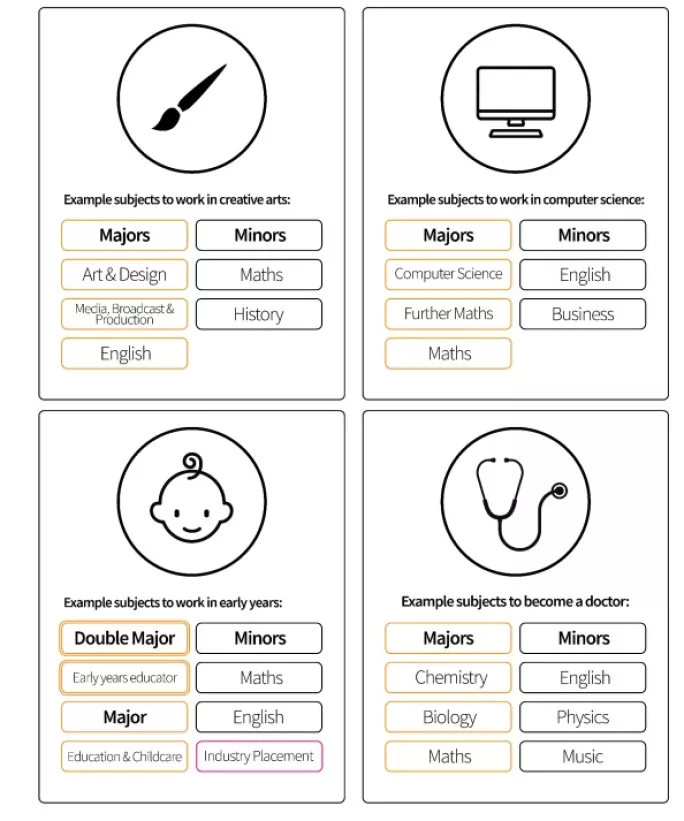
Advanced British Standard: everything you need to know

Prime minister Rishi Sunak has unveiled plans to create an entirely new qualification called the Advanced British Standard (ABS).
Speaking at the Conservative Party conference, he said the ABS would “bring together A levels and T levels into a new, single qualification for our school leavers” and in doing so “finally deliver on the promise of parity of esteem between academic and technical education”.
Furthermore, the ABS would also require all students to continue with maths and English study until 18, aligning with previous plans.
But how exactly will the ABS work, what subjects would it include, what will it cost and will it ever actually happen?
How will it work?
Perhaps the first thing to understand about the proposals is that ABS would see students split their work between major and minor units of study, with majors having “comparable depth and rigour to A levels”, which is defined as having at least 90 per cent of current A-level content.
Meanwhile, the technical subjects on offer will be based chiefly on the content of T levels. For those students who wish to focus on a highly specialised degree such as health or childcare, there will be options to take a double major.
Specifics on what minor courses would entail are not provided, though.
The below image gives four examples of how the different courses students take could be arranged.

Meanwhile, for maths and English, which would become compulsory until 18, the idea would be that a raft of options would exist - from taking the courses as majors to tests that help students “acquire the basic English and maths they need to succeed in work and life”.
The proposals document also sets out that they will explore whether “an essay-based subject could sufficiently develop and demonstrate written communication and understanding of the English language”.
How it would be funded?
Moving to this model would clearly require more money - something the government does not shy away from acknowledging: “Our Advanced British Standard will require a significant investment in our education system”.
A lot of this would be taken up by the additional teachers required to teach the content, with the proposals suggesting that the average contact time for students will increase by 195 hours to 1,475 hours over two years - up from the current average of 1,280 over two years.
The proposals say more money will be given for “more funded teaching hours” and specify this will be provided as new money, rather than having to come from existing budgets of “other core elements of education” like creative activities, physical activity and personal development.
To help with this, the government claims that as a starting point, over £600 million will be provided to cover a raft of areas.
Perhaps most notably, £100 million will be offered to provide bonuses of £30,000 for new teachers teaching shortage subjects and working in disadvantaged schools. Overall, they would receive £6,000 a year for the first five years of their career.
It also says that around £150 million a year will be given to help more students pass their maths and English GCSE resits, and a further £40 million will go to the Education Endowment Foundation to help create evidence of the best teaching practices for 16- to 19-year-olds, especially disadvantaged students.
Finally, it also says around £60 million will be offered over two years to improve maths education, including by expanding teaching for mastery in maths courses and expanding access to its Maths Hubs.
It is not clear when this additional money would actually be available, however.
Why the change?
Chiefly, the government says England is too out of kilter with other major nations when it comes to how narrow study becomes at 16-18.
The proposals note, for instance, that most students in OECD nations study seven subjects or more between ages 15-18, including in Japan, Germany, Canada and the USA.
It also notes that in nations such as France, time for technical and vocational subjects is also compulsory, while the International Baccalaureate Career-related Programme requires students to take at least two diploma courses in addition to career-related studies.
It argues that moving to a similar system not only “supports young people to be rounded, balanced individuals” but will potentially boost their future earnings too.
“Studies have found that where students study subjects from more than two subject groups (eg, science, humanities, arts), this delivers an earnings premium of 3-4 per cent, even after taking into account student characteristics and attainment,” the proposals say.
When would it happen?
Not soon.
In her foreword to the proposals, education secretary Gillian Keegan says the plan “won’t be delivered overnight”, while later on the document says it will take “a decade to deliver in full”.
Elsewhere, communications from Number 10 have said “pupils starting primary school this term are expected to be the first cohort to take the new qualification”.
In short, then, it’s not something teachers need to worry about for a few years at least, with a White Paper on the proposals not even due until next year. With an election around the corner, too, it’s debatable whether the idea will ever see the light of day.
However, with some in Labour apparently taken by the notion of a wider educational format for post-16 education, it’s still possible some major reform of 16-18 education is on the cards for the future.
You need a Tes subscription to read this article
Subscribe now to read this article and get other subscriber-only content:
- Unlimited access to all Tes magazine content
- Exclusive subscriber-only stories
- Award-winning email newsletters
- Unlimited access to all Tes magazine content
- Exclusive subscriber-only stories
- Award-winning email newsletters
You need a subscription to read this article
Subscribe now to read this article and get other subscriber-only content, including:
- Unlimited access to all Tes magazine content
- Exclusive subscriber-only stories
- Award-winning email newsletters
- Unlimited access to all Tes magazine content
- Exclusive subscriber-only stories
- Award-winning email newsletters
topics in this article



